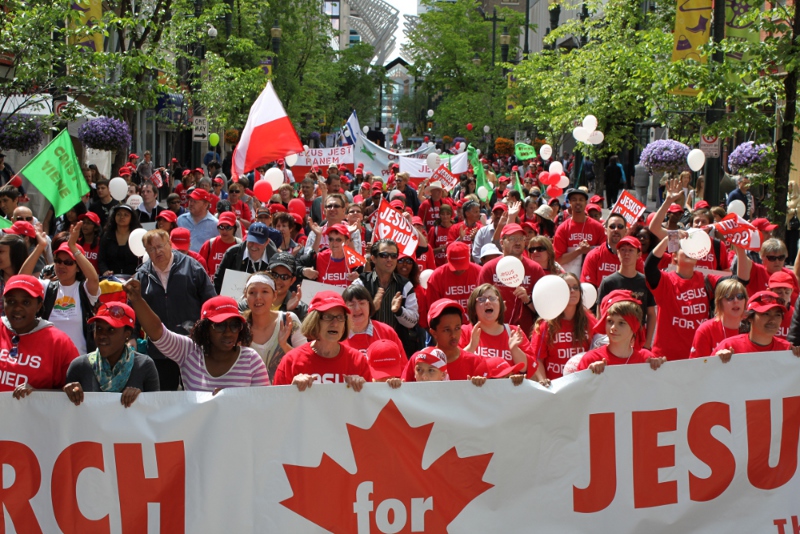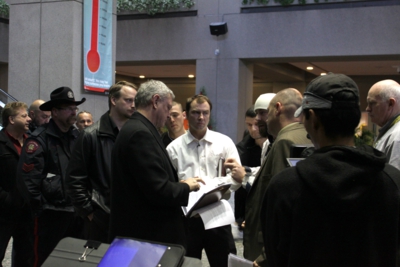Double-Standard For Protestors?
Rob Breakenridge
My latest Calgary Herald column looks at how the city is responding to "Occupy Calgary" protestors and how they’ve responded to other protests:
How fitting that a protest ostensibly aimed at fighting inequality has shown us that some causes are more equal than others.
Here in Calgary, according to Mayor Naheed Nenshi, municipal bylaws are rendered impotent by the might of the Charter of Rights and Freedoms and its guarantee of freedom of expression.
Nenshi was referring to the ongoing presence of protesters in Olympic Plaza. Nenshi did not state that this constitutional reality was specific to the Occupy Calgary protesters, but he didn’t need to.
If the double standard wasn’t already plainly obvious, it certainly became so on Sunday.
After Calgarians were told that municipal bylaws could not be used to disrupt peaceful protest, one Calgarian found out that municipal bylaws can indeed be used to disrupt peaceful counter-protest.
Blogger Cory Morgan brought his pickup truck down to Olympic Plaza, complete with protest signs affixed in the rear. Morgan’s satirical slogans of “More Sunny Days in July” and “Bring Back ‘Arrested Development’” were only slightly more vapid than the empty platitudes of the Occupy Calgary crowd.
That his pickup had no business being in Olympic Plaza only served to place it on equal footing with the tents belonging to Occupy Calgary.
Well, of course, the tents remain, as do the protesters. Not yet a ticket to show for their troubles, either.
As for Morgan? Well, it took just three hours for police to ticket him and tow his vehicle. So it would seem we’ve now gone from merely coddling the Occupy Calgary protesters to actively shielding them, too.
Maybe I’m missing something. Maybe the bylaw-proof guarantees of freedom of expression apply to tents, but not trucks. Maybe the ticketing and removal of a counter-protester from Olympic Plaza was based on advice from constitutional experts.
Although as Morgan himself has pointed out on his blog, it may well be that the city’s position is legally flawed.
Morgan has linked to the 1995 ruling in the case of Weisfeld v. Canada, which concerned the RCMP’s dismantling of a so-called peace camp on Parliament Hill. A federal court ruled that the police actions were a justified limit on freedom of expression.
In other words, the government had a legitimate interest in protecting the grounds and ensuring the openness of Parliament Hill. Those arguments might apply to Olympic Plaza, where the city maintains that the grounds have been damaged and access to the park has been impaired.
Of course, we should always seek to keep state interference in free expression to a minimum.
It would be encouraging indeed if the city’s current position represented a genuine commitment to that freedom, notwithstanding the specifics of the Olympic Plaza situation.
Unfortunately, there’s little evidence of that.
As the city now claims that the Charter might supersede its own bylaws, it is contradicting the position it has so ardently asserted in the case of Calgary street preacher Art Pawlowski, who has been ticketed more than 80 times.
In 2009, a provincial court judge threw out a number of those tickets, declaring that they violated Pawlowski’s freedom of expression and freedom of religion.
It would be wonderful to think that the city’s cautious approach to the Occupy Calgary protests represents an acceptance of its failings in the Pawlowski case.
Alas, the city’s position on Pawlowski is unchanged and it has not wavered in its commitment to prosecute him.
So while Nenshi argues that the situation in Olympic Plaza is not “urgent,” he missing the point.
Whether or not the encampment reaches the level of crisis is irrelevant to the question of whether the city is guilty of a glaring double standard.
Furthermore, what of the precedent being set here? Why should other groups waste time in applying for permits or following other city rules when planning a rally or protest? What basis will the city have for acting when the next protest movement takes over a public space?
There is nothing special or unique about the Occupy Calgary protests. The actions — and inaction — on the part of the City of Calgary seem to imply otherwise, which creates different tiers of rights. Therein lies the real crisis.


